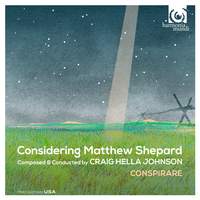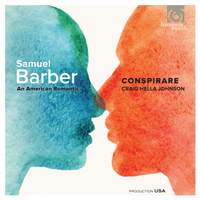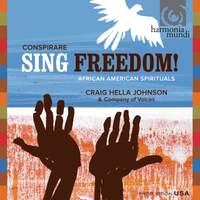Interview,
Craig Hella Johnson on Considering Matthew Shepard
 Craig Hella Johnson is perhaps best known as a conductor - the mastermind behind the amazing sound of Texan chamber choir Conspirare, who have a number of highly successful recordings of contemporary and twentieth-century choral music under their belts.
Craig Hella Johnson is perhaps best known as a conductor - the mastermind behind the amazing sound of Texan chamber choir Conspirare, who have a number of highly successful recordings of contemporary and twentieth-century choral music under their belts.
However, he's also an accomplished composer, as his latest recording with Conspirare shows. Considering Matthew Shepard is Johnson's personal response to the murder of a young gay man in the American West in 1998 - an attack that made headlines around the world, and continues to pose difficult questions to this day.
I asked Craig about how he put this work together, with such deeply troubling subject matter and such a textually and musically diverse style.
The musical styles that you’ve fused together for Considering Matthew Shepard are diverse even by modern standards, with influences ranging from Country & Western to Gregorian chant juxtaposed. How did you ensure that the work retained a sense of cohesion among all these?
This work was born out of an intense heart response I felt when I first learned about the brutal beating and death of a 21 year old gay man, Matthew Shepard, in October 1998. Year after year, I held the intention to respond to this in some way, but it took me a long time, until 2013, before I felt ready to approach any kind of response. In some ways, this piece has been an exploration of one primary question: In the midst of considering such confounding dark reality and violence, is Love to be found anywhere? My intention was to make choices about what would best serve this larger narrative arc and the universal messages I hope it carries. Evans Mirageas first referred to this as a ‘fusion oratorio’ and that designation seemed fitting. I created this work so that Matt Shepard would be remembered, and to create a space for consideration, reflection and unity around his life and legacy. His life and his death have had a huge impact on so many of us and his story has had great impact on cultural change and even legislation.
This is an American story and even more specifically it is a story rooted in the American West. I asked myself, ‘How can I tell a musical story which is a part of this storytelling tradition we call oratorio but which is also rooted in the eclecticism of America, this great cultural merging place?’ . I find that these musical juxtapositions, ( i.e., chant alongside folk song, gospel chorus merged with a chorale, aria in dialogue with a blues melody) can be compelling and symbolically powerful-- allowing each music to speak of its own essence within a larger unified whole. Not a crossover experience, but an internal dialogue within the piece. This can create powerful moments dramatically and emotionally.
I dedicated myself to unity through textual and structural elements. There are three large sections of the work and they are held together thematically. The Prologue sets the stage of the American West and the natural elements and introduces 'Matt’ Shepard (as opposed to Matthew) as young boy and man. The central section is the Passion core of this story which hold the elements of the beating and Matt’s dying and the listener’s relationship to these events and poses questions to the listener. The Epilogue is intended as an invitation to the listener to create space for consideration of this story and our place with each other.
Compared to the Passion settings of Bach (which you state were major influences on you in crafting this work), Considering Matthew Shepard is a much more intimate, chamber-feeling oratorio, especially from the point of view of the small instrumental ensembles you’ve used. Was this a conscious decision, an intentional rejection of a fuller, more orchestral sound?
When I first heard the St. Matthew Passion as a young student, I was deeply moved when I heard the first chorale entrance in the magnificent opening chorus “Kommt, ihr Toechter.” As a listener, I experienced it as an invitation from Bach—that, in the midst of this extraordinary structure, there was a place for me in this story, in this procession. Bach holds the listener with care and thoughtfulness throughout the Passions—with arias which acknowledge and hold the emotional journey of a listener and with the chorales which are familiar and known and which represent important voices and questions. All of this care that Bach had for the listener was a permeating influence for me in attempting to tell this story musically. With regards to instrumentation, I wanted an instrumental ensemble that could be versatile and play a tangible part in the storytelling. Sometimes they play as a mini chamber orchestra, sometimes as a jazz combo; at other times, they create a sense of space or help define characters. The size of the ensemble is also a practical consideration. As a choral conductor, I have had a lifelong love for our big ‘choral stories’-- Elijah, The Dream of Gerontius—and I want modern audiences to have new choral stories that speak clearly and directly to them. So, from a practical standpoint, I wanted to make it possible for groups to be able to afford doing it.
Similarly, your textual sources range over centuries and continents, not to mention words written by yourself – did you deliberately set out to spread your net as widely as possible, or did it simply turn out that the most appropriate texts happened to be from such different backgrounds?
The first texts which grounded this piece came from an extraordinary book of poems by Lesléa Newman called October Mourning. These poems were written in response to Matthew Shepard. In this collection, she includes several 'Fence' poems, each of which presents the Fence as a witnessing observer. I used six of these poems to form the initial structure for the central Passion section of this work. So they really anchor this work’s central section. I composed the Passion section of the piece first for a workshop. Following the workshop, I felt a strong impulse to expand on the work beyond the story of Matt’s suffering and death and it was at this point that I opened the door to include a broad range of text writers as you mentioned, from many countries and continents. I was very clear about my intention for what I wanted this piece to hold, and I began the second phase of shaping the remainder of the libretto. I wanted to introduce Matt Shepard as a young boy and man who had a love for the theatre and so many other things. I needed to set this in Wyoming - and Sue Wallis’ great Wyoming poem 'Cattle, Horses Sky and Grass' was ideal for the opening. I wanted to include poets who could hint at a great procession of life, that this story could be told surrounded by a 'great cloud of witnesses' (both alive and dead): Rumi, Hildegard, Hafiz, W.S. Merwin, Daniel Ladinksy, Dante, others. Much to my surprise, there were some texts I decided to write myself as they felt especially important to me personally. Finally, I had the great pleasure of working closely with the wonderful writer Michael Dennis Browne. He wrote and co-wrote several important texts during the last months of my process and was a beautiful guide and support in shaping the libretto.
My sense is that we will not find our true healing and fullness of being unless we are willing to approach this movement towards healing as a “we.” So the variety of these text writers became for me an important representation of this: “All of Us.”
Given the harrowing subject matter, your musical response is actually quite mellow and meditative – even the most distressing passages remain easy on the ear. Why did you choose to respond this way – and do you think this approach risks sanitising the events of October 1998?
I don’t believe so—suffice it to say, nothing could be further from my intention. The events of October 1998 are what they are: ugly, brutal, horrific, unfathomable and disturbing to the core. It might have been perhaps an easier path for me to take to attempt to musically represent the violence of this story. But my larger intention was to compose a musical framework that could create a space for us to be able to reflect and consider this story and its implications for our own lives. And Matthew Shepard’s place in my life has become so much more than just a very sad story. His life and story have inspired me in countless ways, and the work of his parents, Judy and Dennis Shepard, have had a profound impact in the world. I sincerely hope that this work pays respect to Matthew Shepard by inviting the listener to engage an interior journey of consideration, thoughtfully and deeply.
In some ways, I do think of this whole work as a singing/listening meditation in which, through the telling of this story, we may come to face ourselves fully and to allow ourselves to feel a true impact within, not just a re-creating of the drama of the violence. It is truly a challenge to invite a listener to be with this difficult story in a concert hall (or for a full recorded listening) for over 100 minutes, so I was mindful of wanting to stay connected with that audience-member who might be experiencing a spectrum of emotions.
Believe me, I have felt great anger about Matt’s death and all that surrounds it and I am sure I will, and probably should, remain angry about it for my whole life. But there is also an opportunity here - with Matt’s story and his life’s legacy - that we actually become willing to meet the darkness and to also consider how it is we can come to discover what it is to truly love ourselves and one another. This is of great interest to me. Throughout the last months of composing this work, I sensed a voice within me, as if it were Matt’s own voice: “Don’t leave me at the fence.” I tried to honor that. As I suggest in the work’s title, I am just asking the listener to consider it.
Craig Hella Johnson's Considering Matthew Shepard was released on 16th September on Harmonia Mundi.
Available Formats: MP3, FLAC, Hi-Res FLAC
Other recordings from Conspirare
Perhaps no composer more typifies twentieth-century America than Samuel Barber. Here Conspirare explore his choral works, which have often tended to fall into the shadow of his popular orchestral compositions.
Available Formats: MP3, FLAC, Hi-Res FLAC
The African-American spiritual is a fundamental part of how America's unique musical culture evolved, and continues to evolve (indeed, spiritual-derived elements are audible in Considering Matthew Shepard) - Conspirare perform arrangements of seventeen of the best-known spirituals.
Available Formats: MP3, FLAC, Hi-Res FLAC





